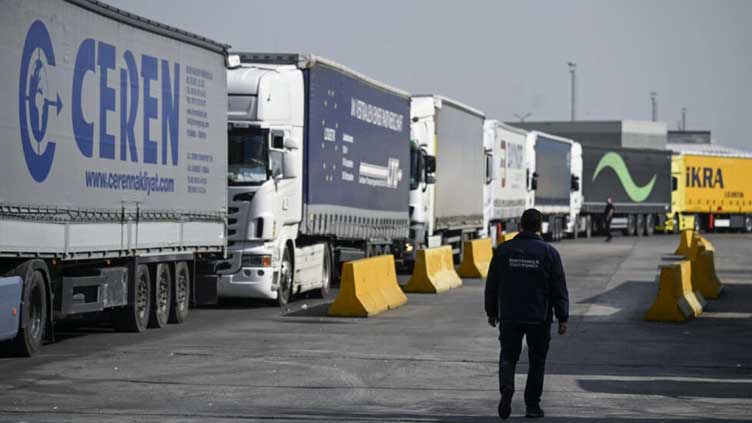From Bulgaria to the English Channel: tracing trafficked migrant boats

World
From Bulgaria to the English Channel: tracing trafficked migrant boats
Kapitan-Andreevo (Bulgaria) (AFP) – The Kapitan Andreevo border post, one of the busiest in Europe, is more than 150 kilometres (90 miles) from the nearest sea, but Bulgarian customs officer Georgi Gospodinov is on the lookout for dinghies.
The crossing between Turkey and Bulgaria is also more than 2,500 kilometres from the English Channel, where Britain has sought to halt a record number of undocumented migrants crossing in small boats.
Gospodinov and other customs officers at the Kapitan Andreevo post have made a key contribution to that campaign.
In a little over a year, 52 motors, 49 rubber boats, 755 hand pumps and 110 life jackets have been seized mostly on Turkish trucks travelling to Western Europe.
British authorities reached out to the Balkan country in late 2022 to stem the entry into the European Union of small boats used for the perilous journeys.
Bulgarian customs officers first set out to prove that the boats they find are intended for the French coast where the crossings to Britain are launched.
Bulgarian customs officers first set out to prove that the boats they find are intended for the French coast © Nikolay DOYCHINOV / AFP
"We left specific marks on the outboard motors and notified our British partners, who were then able to identify abandoned motors on the British shores," he told AFP.
Once it was proven that the same boats were later used by smugglers organising the Channel crossings, imports into the EU of small inflatable boats, motors and life jackets were restricted.
Smell of rubber
Customs officers with sniffer dogs inspect hundreds of westbound trucks at the Kapitan Andreevo checkpoint each day after they pass through an x-ray scanner.
According to the officers, the special shape of the engines is easy to detect, and with time they have become better at recognising the bags containing the carefully folded dinghies.
A sniffer dog specifically trained to detect the smell of rubber was sent by British authorities.
During a visit to Sofia in February, British Foreign Secretary David Cameron said the partnership with Bulgaria was vital to stop the "illegal... terrible trade in human beings" as "many people lose their lives".
Britain has launched a similar cooperation with France.
"Politically, it is a big problem," especially since Britain voted in 2016 to leave the European Union, said Nando Sigona, an international migration expert at the University of Birmingham.
"One of the Brexit promises was to 'take back control' of UK borders," he told AFP, so the "failure to stop arrivals... can be politically lethal".
The situation has weakened Britain's ruling Conservative party. The opposition Labour Party is widely predicted to regain power for the first time since 2010 at an election expected this year.
'Resilient smuggling networks'
In the first quarter of 2024, British officials processed 5,373 migrants landing on the shores of southern England after crossing the Channel in small vessels. It is a nearly 42 percent rise from last year, according to Britain's interior ministry.
Since the beginning of the year, at least seven migrants, including a seven-year-old girl and a 14-year-old boy, have lost their lives trying to reach England.
In 2023, there were nearly 30,000 cross-Channel arrivals in total.
Afghans, Iranians, Turks, Eritreans and Iraqis make up the majority of migrants.
The British government's agreements with several European countries, in particular with Albania -- which resulted in a sharp reduction in arrivals from the Balkan country -- are "producing some effects", Sigona said.
However, "smuggling networks are very resilient and other sources of boats are continuously being identified and pursued," he said.
"You can't solve a problem by tackling the consequences," said Nikolai Posner, a spokesperson for the French aid group Utopia 56, noting that these boats first appeared in 2018 when controls at road crossings were tightened.
"The more barriers, the greater the police presence, the more risks the smugglers take," he said.


